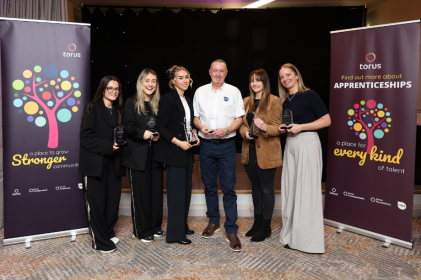Torus breathes fresh air into communities with Indoor Air Quality Project
15 January 2024
In addition to the ongoing work ensuring safe and comfortable homes for its tenants and residents, the North West’s leading social housing group, Torus, has taken part in a pilot project to support families to improve their indoor air quality.
Thanks to funding received from Beyond: Cheshire and Merseyside Integrated Care Board Children and Young People’s Transformation programme, Torus’ charitable arm Torus Foundation was able to deliver the Indoor Air Quality project by engaging with 200 families across Liverpool, St Helens and Warrington.
With Health and Wellbeing being one of Torus Foundation’s key areas of support, it was a fantastic opportunity to be involved in the first project of its kind that focused on respiratory health by empowering participants to monitor their data and be supported by Torus Foundation to make improvements to their air quality and ultimately support improved respiratory health for the whole family but especially for children.
Understanding the direct impact of indoor air on health, Torus Foundation and its Healthy Neighbours Project successfully engaged with communities and encouraged 200 families to agree to a small device being fitted in the home over six months. The small device recorded various levels of particles in the air, temperature and humidity among others which can all affect respiratory health by irritating your eyes, nose, ears and throat, as well as trigger asthma and allergies.
Families were able to check their air quality levels simply by scanning a QR code.
The initiative not only provided immediate insights, but also offered practical tips for residents to make subtle yet impactful changes in their homes.
The transparency brought about by providing direct access to monitor readings to Torus customers, rather than act as ‘gatekeeper’, played a crucial role in building trust. This approach prepared both customers and teams across Torus with tangible evidence to address housing concerns effectively.
The results included many tenants implementing positive changes like quitting indoor smoking, opting for outdoor drying of laundry, adjusting cleaning routines and materials and improving ventilation. Maintenance requests were also submitted to Torus, ensuring necessary improvements in cases of high humidity levels.
In addition, Torus Foundation also provided free support to help Torus tenants and residents optimise their household income and enhance their overall health and wellbeing.
One tenant shared:
"When I’d used fly spray the device was picking up the type of chemicals and levels. I won’t use it in the living room now and I also stopped using the brush to sweep up as it was recording dust levels in the air, a quick once over with the hoover from now on.”
Helen Cibinda Ntale, Head of Health and Wellbeing for Torus Foundation, emphasised the project’s success:
“As a social housing provider, Torus has a responsibility to ensure that our homes support the health and wellbeing of our customers, so it’s been an exciting and innovative project Torus Foundation is proud to help deliver. We’re extremely mindful of the harmful impacts of damp and mould amongst other indoor air quality factors on respiratory health and we’re keen to be involved in an initiative which sought to empower customers to achieve changes to their own indoor air quality to improve their and their family’s health.”
The project was evaluated by Dr Douglas Booker, CEO of National Air Quality Testing Services (NAQTS) and Dr Emma Halliday, Paula Wheeler and Dr Steven Dodd from Lancaster University who work in the NIHR Applied Research Collaboration Northwest Coast.
In addition to analysing data collected during the campaign, interviews and focus groups were held with social housing tenants who had installed monitors.
The resulting reports highlight that there was a marked increase in tenants’ awareness of IAQ based on tenants’ self-rated knowledge. This newfound knowledge triggered behavioural changes, such as altered cleaning habits.
Dr Halliday, Senior Research Fellow for Lancaster University adds:
“The findings offer a positive example of how a housing provider has been working with local community organisations to address improvements to indoor air quality with a view to improving the respiratory health of children.”
As a direct result of our indoor air quality project, St Helens and Warrington Borough Councils have secured their own funding to roll-out a similar project. Torus Foundation is supporting this work in an advisory capacity as well as promoting the project to Torus tenants and residents, which allow even more customers to take advantage of indoor air quality monitors and work towards improving respiratory health.







